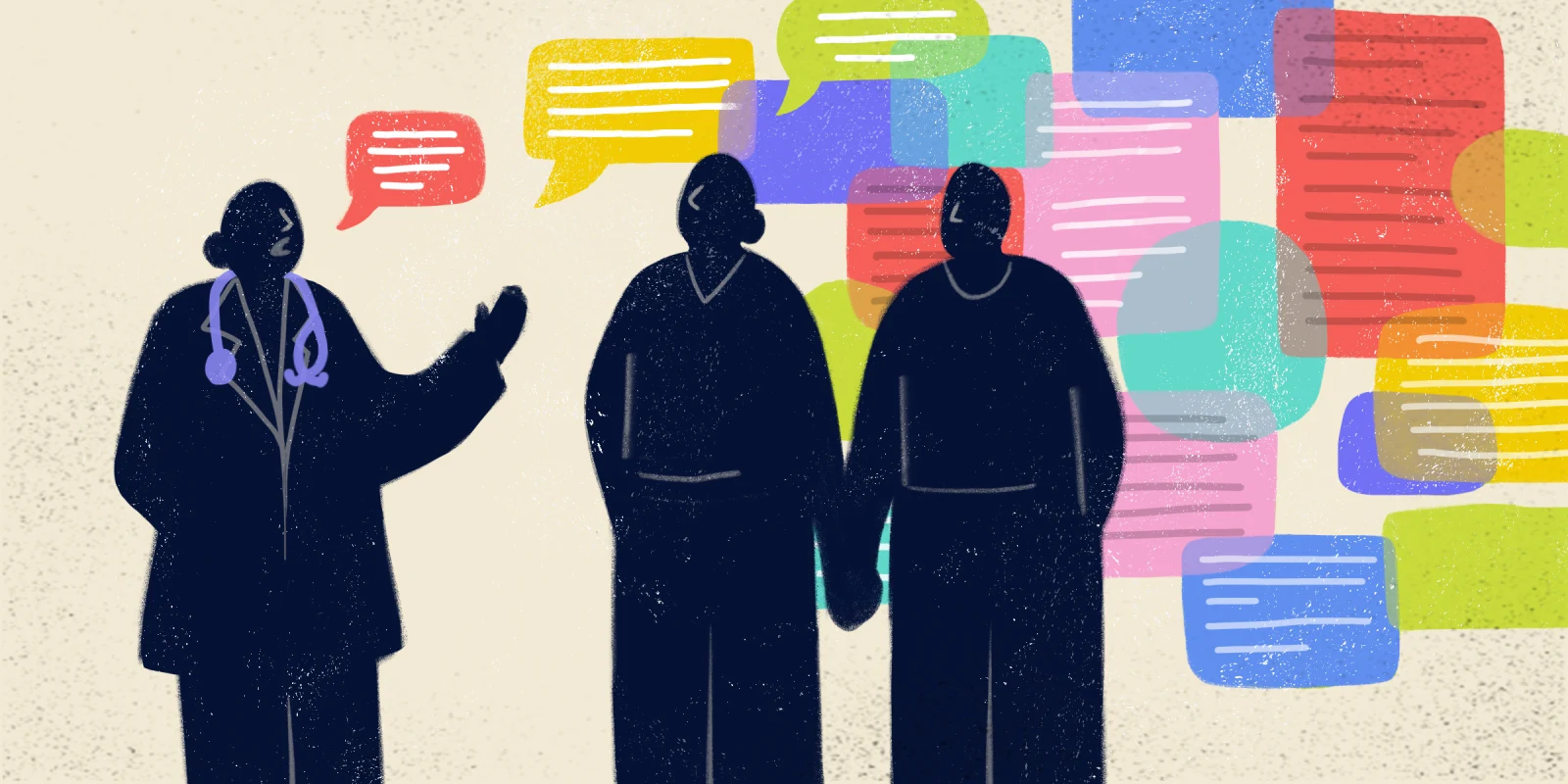I sat awkwardly silent in the exam room with a sobbing expectant mother. I was merely the medical student sent in to obtain history prior to her planned pregnancy termination. She and her husband had received a prenatal diagnosis of Down syndrome for an otherwise desperately wanted pregnancy after multiple pregnancy losses. I wracked my brain, equally desperate to find something, anything to say. Painting a picture of what it means to have someone with Down syndrome in your life, as I do, seemed impossible in the minutes, perhaps seconds left prior to her procedure. Unsure if it was even my place as a student to do so, I ended up simply asking if she felt comfortable with her decision and the information she had. Through tears she nodded, and the procedure was completed as planned.
As I progressed in training, this moment with the crying patient routinely returned to my mind. I will never know if that patient truly was given adequate information in her prenatal testing and decision-making process, but I wanted to ensure others did. When counseling expectant families about prenatal testing, I’d try different methods and phrasing, and always felt that they were woefully inadequate to meet the bar of informed consent. For most physicians and patients, prenatal testing for Down syndrome and other genetic diagnoses is routine, uneventful, and objective. It seems easy to obtain “consent” for testing, a simple yes or no answer. It seems obvious that the more known about the fetus, the better. However, treating the decision to undergo prenatal genetic testing as routine ignores the immense complexity of how pregnancy, parenting, and disability can impact people’s lives. I know I am not the only one who deeply values any one person’s autonomy and choice and yet feels equally uncomfortable with the informed consent process on prenatal testing and the inability of clinicians (myself included) to provide adequate information in minutes in the exam room.
Backing up a bit, informed consent for prenatal genetic testing involves two components: consent for the test itself, and then consent to have a conversation about the results and options for next steps. In my opinion, both forms of consent are inadequate because they often fail to consider the disability rights perspective. One key component of this perspective is the expressivist critique of prenatal testing, which holds that prenatal testing and selective termination ultimately devalue the lives of individuals with disabilities by focusing on only the disabling trait. Just as we should strive not to judge any other individual based on a single trait such as race, ethnicity, gender identity, sexual orientation, political leanings, or religious views, so too should we avoid judging based on any single diagnosis. Prenatally, however, this is complicated, as we lack the opportunity to see and appreciate other likely positive traits. The complexity of this issue is not something that can be distilled into a simple “Do you consent, yes/no” question — and so it baffles me when it’s treated as routine.
Similarly, counseling after a diagnosis is made is another area where disability scholars have issued critiques. The disability rights perspective on the issue is that most professionals and the general population are misinformed about the reality of life with Down syndrome, wrongly believing that such a life is negative. These lay perceptions clash with the self-reports of people with the disability. The negative framing of Down syndrome by professionals can have unintended consequences: I have spoken to numerous parents who have received prenatal or postnatal diagnoses of Down syndrome for their children and who found the experience of receiving a diagnosis to be traumatic, typically due more to the way the diagnosis was delivered than to the news itself. This framing of the diagnosis as highly negative muddies patients’ ability to decide what to do next re: keeping or terminating the pregnancy, and as such hardly seems like robust informed consent. Some parents I’ve talked to have even described immense pressure from clinicians to terminate a pregnancy after receiving a Down syndrome diagnosis prenatally, even after parents have clearly articulated their plans to continue the pregnancy and celebration of their expected child.
Given the preponderance of these parental stories, and my own discomfort with the status quo, I have spent hours contemplating what the ideal version of informed consent for prenatal genetic testing would look like. These musings are made more complex as, consistent with many other disability rights advocates, I am also a strong advocate for reproductive autonomy, choice, and women’s rights. However, I am confident that truly informed counseling about testing and diagnosis in fact promotes reproductive autonomy rather than limits it, however difficult it may be to achieve.
I ultimately stumbled upon what I consider to be an example of excellent prenatal counseling on my journey to becoming an adoptive parent. After spending countless hours learning about the tenets of ethical adoption practices and grilling agencies on their practices, I discovered the National Down Syndrome Adoption Network. I learned that they not only prioritized ethical adoption practices but also served as an example of what informed counseling on a Down syndrome diagnosis should look like. The organization spends hours, sometimes all night, counseling expectant families on Down syndrome and all of the choices they could make around it (parenting, forming an adoption plan, termination). Counseling typically does not occur in a single session and often includes connecting individuals with families raising children with Down syndrome and local support services. Of course, this is a process that would be hard to replicate in the clinical setting — but we can certainly learn from its example.
Accordingly, to inject more nuance into the informed consent process, I believe that clinicians should do the following:
1) Become aware of the ethical issues and perspectives of people with disabilities and their families when counseling and caring for patients. Undoubtedly, this awareness will subtly influence the way clinicians talk about disability, parenting, and decision-making related to genetic testing.
2) Recognize that while the test may be important for preparing parents for required lifestyle changes and the need for support that comes with managing a child’s disability, its mere existence can perpetuate a negative notion of disability. To counter this, it is important for clinicians to consider the benefits and joys that come with parenting and the value of disability in our world, and to impart this information to patients so their decision to take the test is a genuinely informed one.
3) Remember that the delivery of a Down syndrome or other diagnosis can and will be remembered forever, and treat the conversation with the weight it deserves. I like to do this by beginning with congratulating the family and providing adequate time for the conversation, allowing for multiple sessions if needed. I also recommend ensuring that both parents and/or other important individuals are a part of the conversation, depending on family structure.
4) Remind patients that a Down syndrome diagnosis is not inherently negative for a patient or family. Offer patients accurate and unbiased information, including on organizations supporting people with Down syndrome or other diagnoses and their families. Aim to connect patients with these organizations and families as best you can.
A brief article like this one can barely skim the surface of the issues that arise in prenatal testing, disability rights, reproductive justice, and adoption ethics. However, my hope is that by highlighting the current cavalierness around the genetic prenatal testing consent process, we can change it. It is important to use the limited time with patients to express that the genetic testing process is not a simple yes/no, but rather something that requires true informed consent. This cannot be achieved without outside resources, including from disability rights scholars. These are tactics that all clinicians can take up, and we needn’t be ethical experts to do so.
How do you talk to your patients about prenatal testing? Share in the comments.
Dr. Emily Johnson is a family medicine physician who specializes in the care of adults with intellectual and developmental disabilities. She enjoys cycling, power lifting, language learning, and goofing around with her toddler. Dr. Johnson is a 2024–2025 Doximity Op-Med Fellow.
Illustration by Diana Connolly







